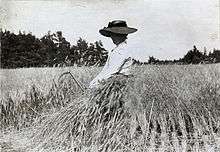Harvest

Harvesting is the process of gathering a ripe crop from the fields. Reaping is the cutting of grain or pulse for harvest, typically using a scythe, sickle, or reaper.[1] On smaller farms with minimal mechanization, harvesting is the most labor-intensive activity of the growing season. On large mechanized farms, harvesting utilizes the most expensive and sophisticated farm machinery, such as the combine harvester. The term "harvesting" in general usage may include immediate postharvest handling, including cleaning, sorting, packing, and cooling.
The completion of harvesting marks the end of the growing season, or the growing cycle for a particular crop, and the social importance of this event makes it the focus of seasonal celebrations such as harvest festivals, found in many religions.
Etymology
"Harvest", a noun, came from the Old English word hærfest, meaning "autumn" (the season), "harvest-time", or "August". (It continues to mean "autumn" in British dialect, and "season of gathering crops" generally.) "The harvest" came to also mean the activity of reaping, gathering, and storing grain and other grown products during the autumn, and also the grain and other grown products themselves. "Harvest" was also verbified: "To harvest" means to reap, gather, and store the harvest (or the crop). People who harvest and equipment that harvests are harvesters; while they do it, they are harvesting.
Crop failure
Crop failure (also known as harvest failure) is an absent or greatly diminished crop yield relative to expectation, caused by the plants being damaged, killed, or destroyed, or affected in some way that they fail to form edible fruit, seeds, or leaves in their expected abundance.
Crop failures can be caused by catastrophic events such as plant disease outbreaks (see e.g. Great Famine (Ireland)), heavy rainfall, volcanic eruptions, storms, floods, or drought, or by slow, cumulative effects of soil degradation, too-high soil salinity, erosion, desertification, usually as results of drainage, overdrafting (for irrigation), overfertilization, or overexploitation.
In history, crop failures and subsequent famines have triggered human migration, rural exodus, etc.
The proliferation of industrial monocultures, with their reduction in crop diversity and dependence on heavy use of artificial fertilizers and pesticides, has led to overexploited soils that are nearly incapable of regeneration. Over years, unsustainable farming of land degrades soil fertility and diminishes crop yield. With a steadily growing world population and local overpopulation, even slightly diminishing yields are already the equivalent to a partial harvest failure.
Other uses
Harvesting commonly refers to grain and produce, but also has other uses: fishing and logging are also referred to as harvesting. The term harvest is also used in reference to harvesting grapes for wine. Within the context of irrigation, water harvesting refers to the collection and run-off of rainwater for agricultural or domestic uses. Instead of harvest, the term exploit is also used, as in exploiting fisheries or water resources. Energy harvesting is the process of capturing and storing energy (such as solar power, thermal energy, wind energy, salinity gradients, and kinetic energy) that would otherwise go unexploited. Body harvesting, or cadaver harvesting, is the process of collecting and preparing cadavers for anatomical study. In a similar sense, organ harvesting is the removal of tissues or organs from a donor for purposes of transplanting.
Harvesting or Domestic Harvesting in Canada refers to hunting, fishing, and plant gathering by First Nations, Métis, and Inuit in discussions of aboriginal or treaty rights. For example, in the Gwich'in Comprehensive Land Claim Agreement, "Harvesting means gathering, hunting, trapping or fishing..."[2] Similarly, in the Tlicho Land Claim and Self Government Agreement, "'Harvesting' means, in relation to wildlife, hunting, trapping or fishing and, in relation to plants or trees, gathering or cutting."[3]
See also
Notes
References
- ↑ American Heritage Dictionary (4th ed.). Boston: Houghton Mifflin Co. 2000. ISBN 0-618-08230-1.
- ↑ "Gwich'in Comprehensive Land Claim Agreement". Aboriginal Affairs and Northern Development Canada website.
- ↑ "Tlicho Agreemen". Aboriginal Affairs and Northern Development Canada website.
External links
| Look up harvest in Wiktionary, the free dictionary. |
| Wikimedia Commons has media related to Harvest. |
| Look up harvest in Wiktionary, the free dictionary. |